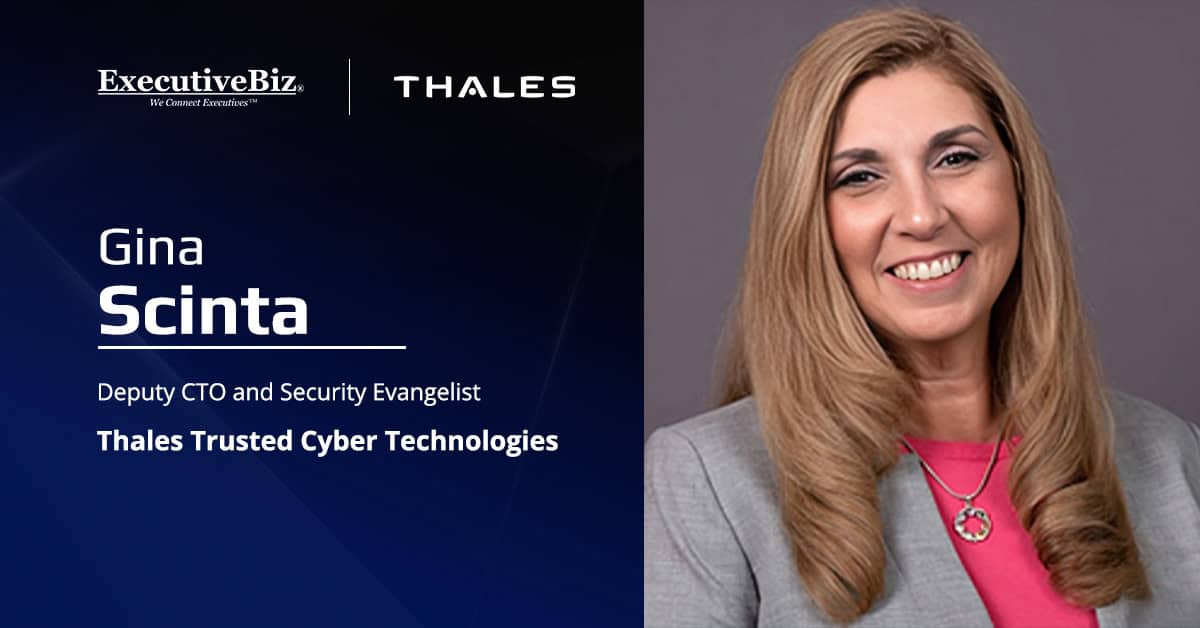Gina Scinta, deputy chief technology officer and security evangelist at Thales Trusted Cyber Technologies, discussed in a video interview with GovLoop how artificial intelligence can help federal agencies strengthen cyber protection.

Join us for the Potomac Officers Club’s 2026 Artificial Intelligence Summit on March 19, featuring top voices from agencies and industry. Register now to explore cutting-edge use cases and be part of the conversation shaping the future of AI in government.
“They can leverage the artificial intelligence for intrusion, detection and prevention, where you can identify unusual activity on your network and alert security personnel to a potential emerging threat,” Scinta told Candace Thorson, managing editor at GovLoop, during the interview.
She noted that AI accelerates cyberthreat intelligence, phishing detection, vulnerability management and password security.
AI allows agencies to make “decisions faster and things can be discovered quicker than you might have been doing it in a manual way in the past,” she added.
What Measures Can Agencies Take to Secure Data That AI Systems Use?
Scinta said agencies must rethink how they handle training data. At government conferences, she has seen a shift toward more selective data intake. “[They] want to introduce less data rather than more. Be smart about the data that they introduce. Don’t just bring everything in the kitchen sink,” the deputy CTO said.
The Thales TCT executive warned that highly sensitive government material often does not belong in AI models and stressed the need for encryption and tight access control.
“You should be encrypting and protecting that sensitive data and controlling who and what has access to that information in an AI model,” she said.
She emphasized that security must be implemented from the outset, not as an afterthought.
Scinta also cited how identity access management practices could help agencies limit access to sensitive datasets.
Why AI Security Remains Difficult?
Government agencies often fear that security measures could hinder their work, Scinta said, though those concerns are largely unfounded. The bigger challenge is that many AI models require modification to fit defense and federal environments. “The algorithms don’t fit into the model of what they’re trying to do, especially from DOD environments,” she said.
Scinta also highlighted the growing emphasis on human oversight.
“So AI can give you the results faster than you might be able to do it manually on your own but you’re going to need that human intervention to verify that and I think that’s really important too, is don’t lose sight of the fact that it’s together like the human and machine in AI to verify the results is extremely important,” she noted.
What Are Gina Scinta’s Final Takeaways on AI & Data Security?
In the interview, Scinta warned that AI raises the risk of data alteration.
“For years, we’ve been worried about data breaches where our adversaries are stealing our data to do whatever they’re going to do with it… But with AI, the concern is not stealing the data, but altering the data. And my number one takeaway is why data protection and control of who has access to the data is even more important with AI,” she said. “[The] altering of that AI data could affect critical decision making that could affect national security.”
She said agencies should embrace iteration and be willing to adjust, as not every AI implementation will work the first time.
“And if [you] learn like this is not working, don’t try to force it to fit or force it to work, go back to the drawing board and say what can we do to make it work better,” she noted.
As agencies move toward high-risk applications and highly sensitive data, Scinta advised them to proceed cautiously.





